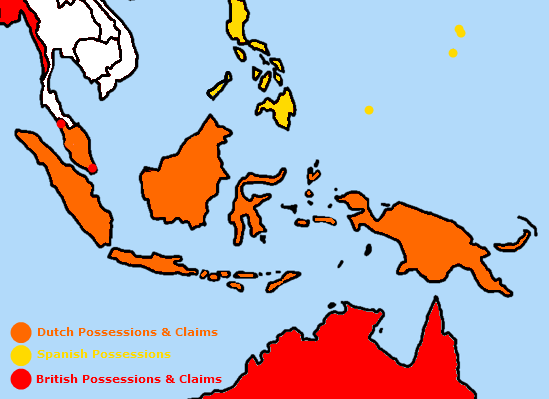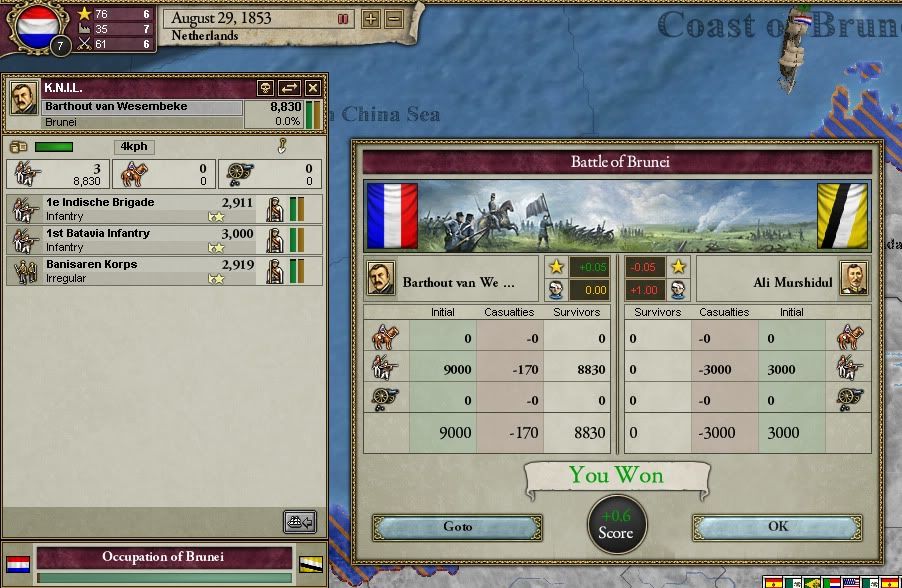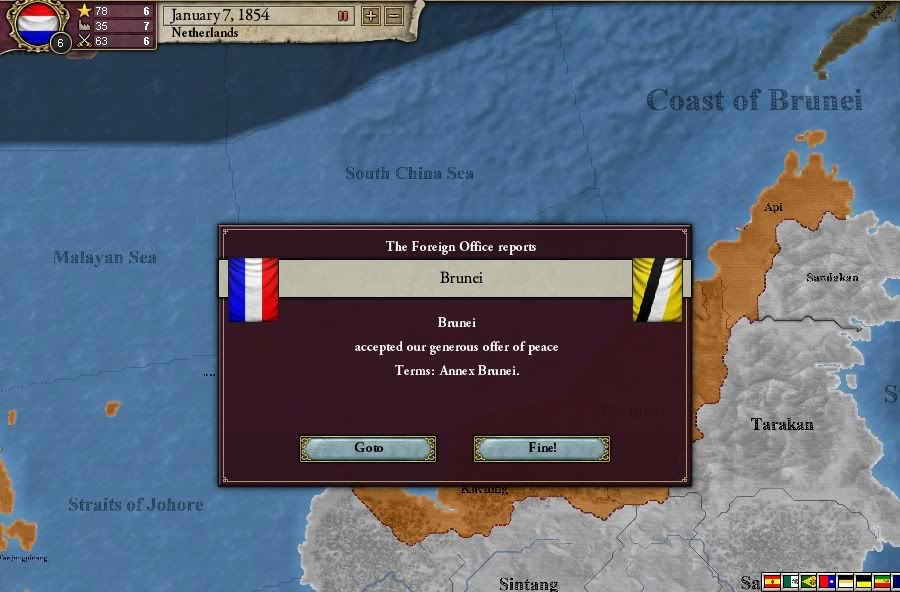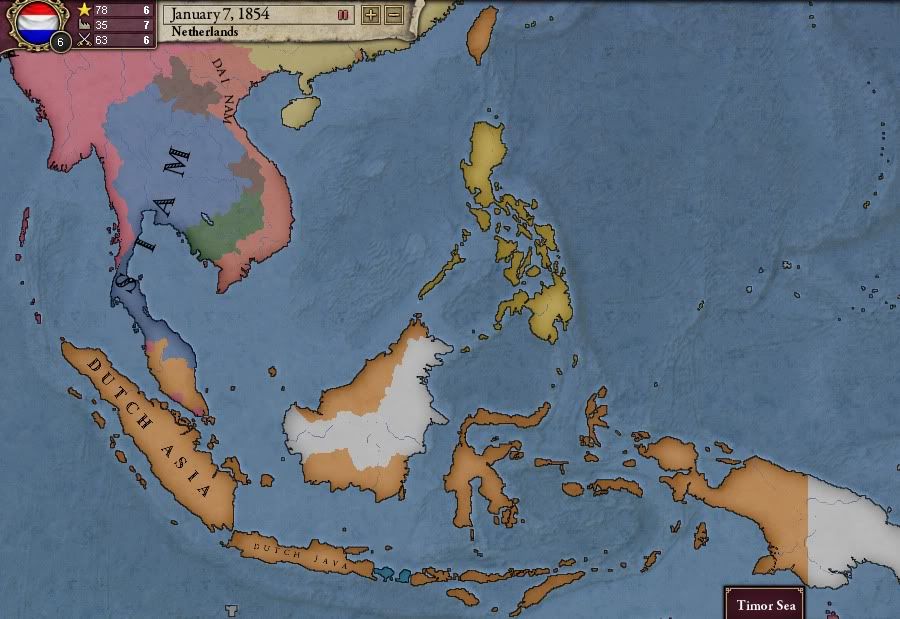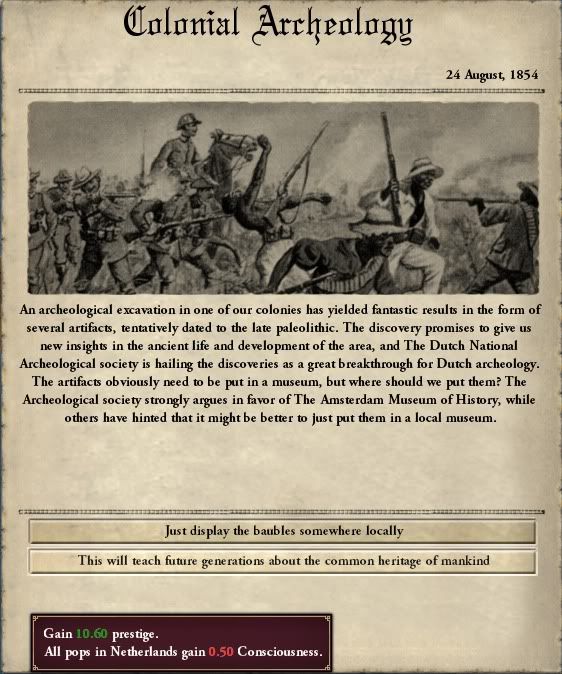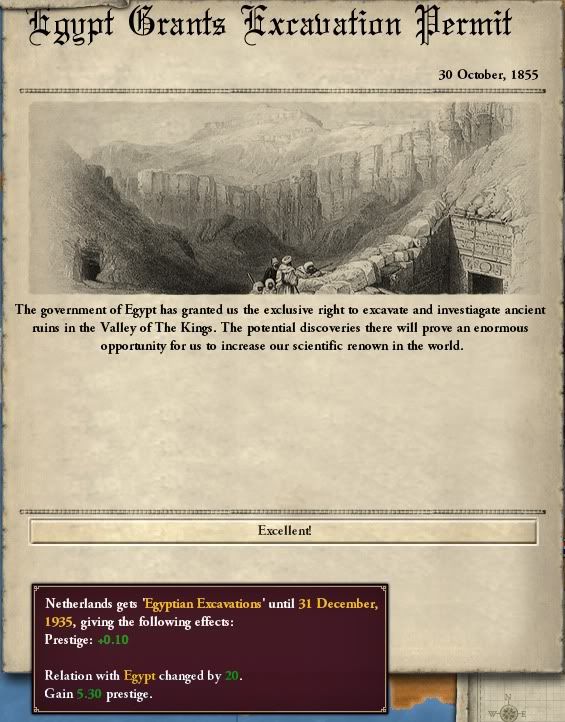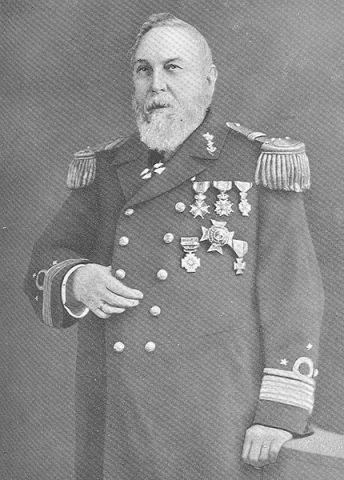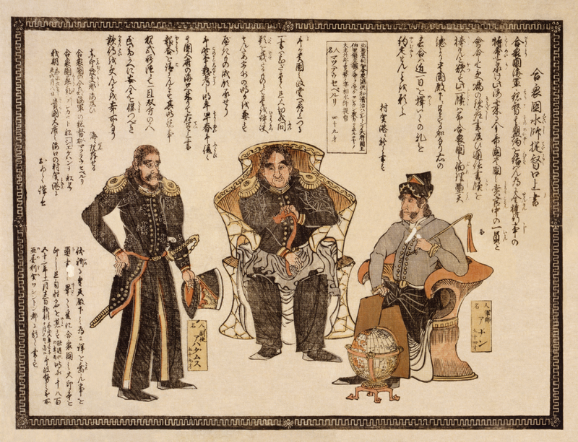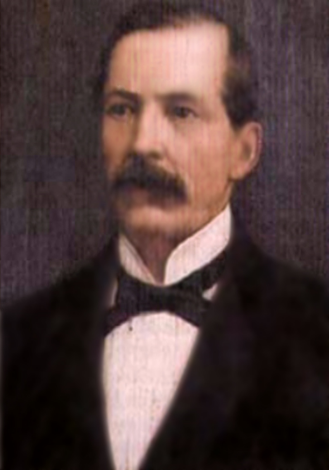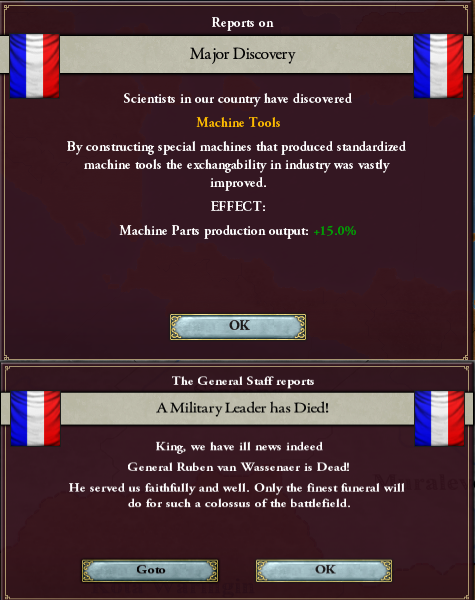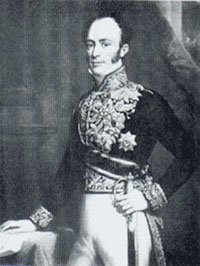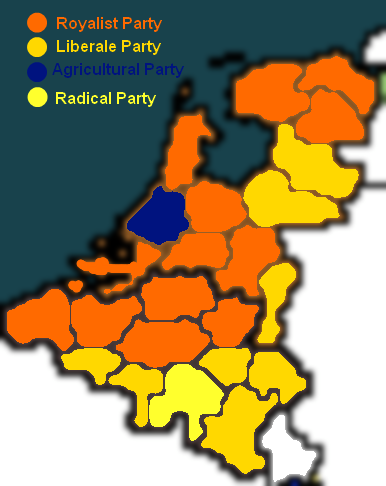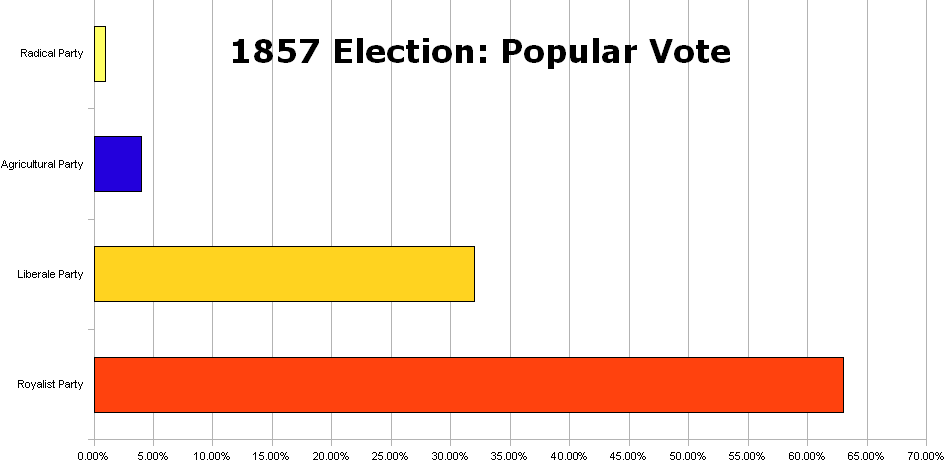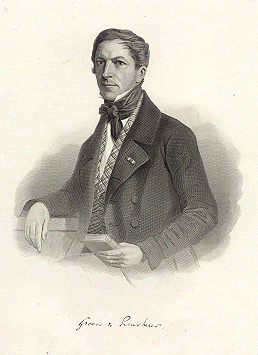"The West Wind Blows Again": Dekker's First Term in office 1852-1857
Spreading the West Wind: The Orange Map and the White Raja
"For as long there has been culture and humanity there have been two winds blowing in this world: the Wind which blows West from Constantinople and that which blows East from Constantinople. There is a saying that only one of these winds which will prevail and I believe it is fair to say that the West Wind shall prevail over the East. That is to say that the West Wind of Christianity and Civilisation shall prevail over the East Wind of Heathenism and Barbarity."
Eduard Dekker, First Prime Minister of The Netherlands: victory speech.
Having been a member of the Pro-Imperialist lobby before election and elected on a campaign promise of expanding the Dutch Empire, PM Dekker wasted no time in petitioning King Frederik for imperial expansion, and laid out a long-term plan for expansion in the East Indies. The "Oranje Map" as it came to be known, laid Dutch claims on all territories unclaimed in the East Indies.
Dekker's Oranje Map divided SE Asia between the three Great Powers active in the region: The Netherlands, Great Britain and Spain. Note that British-controlled Malacca is included with Dutch Malaya.
Frederik had no intention of re-claiming Malacca and Eduard Dekker knew it. Dekker convinced Frederik that by claiming Malacca he could convince Britain to accept Dutch hegemony in the region in exchange for keeping Malacca. Frederik and Dekker knew that British Influence in the region was growing and that it was a matter of time before "White Raja" Sir James Brooke added Brunei to the British Empire; they also knew that the current Prime Minister of Great Britain, George Hamilton-Gordon, was far too busy with the Crimea to worry about SE Asia and that if they acted now and quickly they might just be able to take Brunei from under Britain's nose with minimal fuss. With Frederik's blessing, Dekker declared war on the 13th of December 1852.
Just as Dekker predicted, Britain was too preoccupied to respond. Rookie commander Sir James Brooke led the Sultan of Brunei's forces against the Dutch Colonial Army led by General Daniel Tasman, hero of the Aceh, Malaya and Formosa campaigns. The Brunei Army was slow to respond, and the first and only battle commenced on the 29th of August 1853 after most of the Bruneian countryside had been occupied.
Daniel Tasman ordered the annexation of Brunei into the Dutch East Indies on the 7th of January 1853. The Sultan and Sir James Brooke were both repatriated to Great Britain on the orders of King Frederik, where the latter was sent to fight in the Crimean War on the Queen's orders. Frederik's humane treatment of both the Sultan and Sir James was a major factor in Britain's lack of response.
The Dutch East Asian Empire after the Annexation of Brunei
The East Indies wasn't the only place for expansion. During the war with Brunei, Dutch Shipyards made several advances in sea propulsion. From 1852 to 1854 King Frederik ordered the construction of new, steam-propelled transports to replace the Dutch Navy's aging Clipper fleet. Most of these ships were sent to duties with the Home Fleet, apart from six: which were constructed in newly-commissioned shipyards in Java for service in the East Indies Fleet.
HNLMS Batavia
One of six new steam-propelled transports constructed on the island of Java.
In addition to Naval progress, education and scholarship made great leaps under Dekker, as one would expect from a Prime Minister who was himself a writer. During this time many debates were conducted in public forums all over the Netherlands over the role of the State and Government. After the success of the war with Brunei Dekker drummed up further support for Dutch Imperialistic ambitions with his literary works, publishing his treatise
Nationalisme en Imperialisme in 1855.
Unlike
Max Havelaar,
Nationalisme en Imperialisme was a historical essay and treatise. It argued that contrary to popular thought, Nationalism was a precursor to Imperialism and necessary for the growth of it, rather than being responsible for it's decline, as predicted by anti-imperialist schools of thought. Dekker believed that Nationalism was a crucial ingredient in keeping an empire together, and that the benefits of convincing newly conquered people they were part of a greater empire were greater than simply oppressing them. "One favours cooperation while the other leads to confrontation", argued Dekker.
Dekker also argued that understanding of history was paramount to any empire, as based on his experiences in Asia, precedent and it's citation can be a powerful force. With the King's blessing, Dekker ordered the commencement of several archaeological expeditions in both Dutch and non-Dutch lands. The expeditions payed dividends almost overnight.
Excavations in newly-added Brunei pointed to previously unknown Dutch settlement in the region, possibly dating back to the days of Spanish rule. Further excavations pointed to Bruneian remains dating back as far as ancient Egypt, possibly challenging the theory that Egypt was the first great empire
Dutch Archaeologists and Egyptologists were keen to test this theory, and excavations in Luxor soon commenced. This was one of the first interactions the Dutch Government made with Egypt
Cultuur Imperialisme under Dekker
Frederik was keen to expand Dutch Influence overseas while wary of angering any of Europe's colonial powers, Dekker's solution was the application of the Cultuur Imperialisme policy used in Colombia. Dekker proposed that intimidation and Dutch technological and cultural superiority could be used to bring countries under the Dutch heel. Frederik himself had several targets in mind, and intended to leave the Boer Republics to Great Britain but parliament and popular demand forced him to make at least a token attempt to influence them.
Japan and Gregory's "Black Ships"
Japan was high on the Frederik's list. Trade with Japan had been a staple of the Dutch economy for over 250 years but at Japanese insistence it proceeded at a trickling pace rather than the stream it could be. Many Dutch Military advisors believed that a full-scale invasion of Japan was unfeasible due to Japan's large population and fierce warriors, so Dekker looked to Dutch Naval superiority as a means to threaten Japan.
The man tasked to lead the Dutch mission to Japan was Vice-Admiraal Frederik Gregory. He would be tasked with opening up trade with Japan by force, if necessary. Gregory would have some of the most advanced ships in the world at his disposal, including the six steam-propelled transports built in Java. The expedition arrived in Edo on the first of June 1856.[1]
Vice-Admiraal Frederik Gregory, the man tasked with opening up Japan to further Dutch trade
Unlike previous attempts by western powers (including Dutch attempts), Gregory went straight towards the Japanese capital rather than Nagasaki. Gregory knew enough about Japan to know that he had to be arrogant to be heard, and a threat at the heart of Japan would be much more intimidating than one at Nagasaki.
The Japanese were shocked by the arrival. This was the first time any Japanese had seen a steam-powered ship before, even more shocking was the attitude of the Dutch. Before this expedition trade with Japan had been done on Japan's terms, never before had a foreign mission been audacious as to lay demands on the Japanese. Gregory's terms were simple; either Japan opened itself to Dutch trade or he would level Edo.
To the Japanese there was no alternative, Japan was ill-equipped for a naval assault, and there was a fear among some in the Shogun's court that Edo Castle itself could be threatened, even though it was 4 Kilometres away from the nearest waterway. Nevertheless the Shogun was pressured into signing what became known as the "Dutch Letter" agreement, granting the Dutch exclusive trade rights in Japan and opening up five new ports (Osaka, Hiroshima, Nagoya, Edo and Naha) to Dutch trade.
Although not worth as much as the Japanese trade, Korea was an important trading partner to Frederikstad and other Dutch settlements in Formosa, while Indonesia proved a profitable market for goods from Java and the Dutch East Indies. After his success in Japan, Gregory was sent to negotiate with the Koreans and Vietnamese, where he used a much more subtle approach than with Japan.
Stylised impressions of the Dutch sailors under Vice-Admiraal Frederik Gregory painted by Japanese artisans circa 1856.
The 1856 Acquisition of Panama
As we saw in Chapter V, Colombia was a nation crippled by debt and depression. In an attempt to alleviate the suffering of the Colombian populace, Newly elected President Manuel María Mallarino renewed calls for a Canal to be built across Panama. Manuel hoped that building a Canal would provide ample employment opportunities for Colombia's embattled citizens and that the canal could be sold to Dutch authorities in an attempt to alleviate Colombia's national debt. President Manuel contacted French engineer Ferdinand de Lesseps to oversee construction. According to the deal, Colombia would pay for the construction and sell the Canal and the surrounding province of Balboa and in exchange The Netherlands would forgive Colombia's national debt within 10 years.
Acting President Manuel María Mallarino, the man credited with saving Colombia from economic depression
Construction on the Canal began in 1856, the news was dampened by the death of the Dutch Deputy Prime Minister, Chief of Staff and hero of the War of Unification Ruben Van Wassenaer.
The death of Ruben van Wassenaer coincided with the construction of the Canal at Balboa. After completion it was named the Wassenaer Canal in his honour.
Coming up next: first an election update, then part two and Britain's response to the Oranje map.
[1] In this timeline, the US have no provinces bordering the Pacific Ocean, hence have no interests in the pacific, hence no Perry expedition.
 Let's celebrate with an update shall we?
Let's celebrate with an update shall we?




